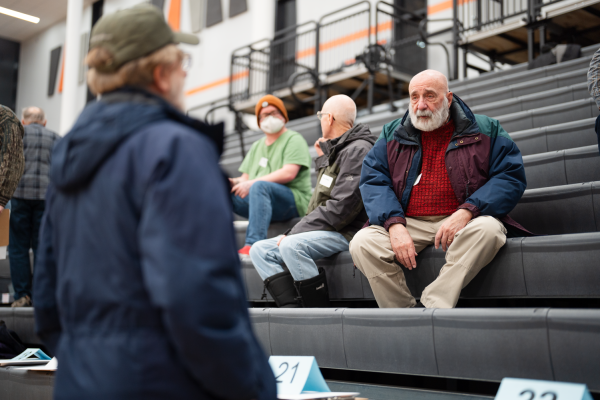Storm-fatigued Gulf Coast in crosshairs again
September 9, 2008
BATON ROUGE, La. — The Gulf Coast watched anxiously as Hurricane Ike trudged toward areas still cleaning up after Gustav, with disasters pre-declared in much of eastern Texas and Louisianans urged to stock up — again — on supplies.
Texas Gov. Rick Perry spurred storm preparations with the declarations in 88 counties, and the National Hurricane Center warned the storm could make landfall this weekend in Texas — possibly not far from Corpus Christi. Perry also put 7,500 National Guard members on standby.
However, storm paths are hard to predict several days in advance, and forecasters said the storm could come ashore anywhere from Louisiana to Mexico.
“While Hurricane Gustav is still fresh on the minds of coastal residents, we must now turn our attention to Hurricane Ike as it poses a potential threat to the Texas coast,” said Perry, who also requested a presidential disaster declaration for the counties.
In Louisiana, where thousands remain without power after Hurricane Gustav hit last week, Gov. Bobby Jindal urged residents to start stockpiling food, water, batteries and other supplies. The state also was readying shelters and making plans for trains, buses and planes in case a coastal evacuation is called later in the week.
“It is still too early to be evacuating certainly, but it is not too early to be making sure you’ve got food and water and batteries. It’s not too early to be checking your car,” Jindal said.
The Federal Emergency Management agency was uncertain about the timing of evacuations along the coast. It would be at least 24 to 48 hours until officials have a clearer picture of Ike’s intended path — and officials need to evacuate communities 48 hours before a storm’s winds kick up.
“That puts us right in middle of when we should be moving people,” Glenn Cannon, FEMA’s head of disaster operations, said Monday.
Jindal said he doesn’t anticipate the sort of mass evacuations forced by Gustav, which emptied out most of south Louisiana, including the New Orleans area. But even without a direct strike, the state’s low-lying parishes could face strong tidal surges, tropical storm winds and heavy rains from the storm.
In southwestern Louisiana, Dick Gremillion of the Office of Emergency Preparedness for Calcasieu Parish, estimated that 80 percent of the parish’s 185,000 residents left for Hurricane Gustav and officials were preparing in case evacuations are needed for Ike.
“We’re hearing a lot about the public having evacuation fatigue. The main problem is financial. A lot of people just don’t have to money to do it two weeks in a row,” Gremillion said.
Florida Keys residents, meanwhile, breathed a sigh of relief that Ike had turned West. A hurricane watch for the island chain was discontinued Monday. But Ike still delivered turbulent weather to the islands and authorities said people should stay indoors for now or stay away until Wednesday if they had already left.
Key West was battered by gusty winds and sporadic, sideways downpours Tuesday morning. High surf washed over several beaches, leaving several feet of water on some roads, but flooding was light and spotty. Residents walked the streets along the coast, getting splashed with waves and enjoying the cool breezes that were a break from typical hot and humid weather.
“Cuba took one for us again,” said Jon Harper, 49, who owns a day spa in Old Town on the western tip of Key West. “This is nothing… It’s a nonevent. It’s a drill. You go through it with all the angst and then you relax and have a beer.”
Power outages were reported in Marathon and Islamorada, where pounding rain persisted through the night, but it wasn’t immediately clear how many people were affected.
Ike roared ashore in eastern Cuba Sunday night as a Category 3 hurricane, blowing homes to rubble and sending waves crashing over apartment buildings. By Monday afternoon when the storm weakened along the country’s southern coast, 1.2 million Cubans had evacuated and at least four were dead.
At 8 a.m. EDT Tuesday, Ike was a Category 1 hurricane with maximum sustained winds near 80 mph. It was centered about 40 miles south of Cuba’s capital, Havana, and moving west-northwest near 13 mph. Forecasters said the hurricane was likely to strengthen when it moved into the Gulf of Mexico on Wednesday.
The storm first slammed into the Turks and Caicos and the southernmost Bahamas islands as a Category 4 hurricane that peeled off roofs and knocked down buildings. It also pelted Haiti, killing at least 61.














